When it hurts
Signe Sandfeld Hansen, M.Sc. in Psychology and counsellor, CfDP Bullying is a complex phenomenon, and it can be difficult to completely explain what happens, and what it means to the individual and/or group. So, we have involved our young people and created a dialogue to learn more about what youth think about bullying, what you can do to stop bullying, and why bullying takes place at all.
“As a victim of bullying, you get a sense that it’s your own fault, or that others won’t believe or understand you if you tell someone, for instance your parents or teachers”
Anonymous youth during our group chat on bullying
Group chats on bullying during January
Each week, we organised a group chat activity where young people were invited to discuss different topics related to bullying. Concurrently, we wrote 7 articles on bullying. We have articles on sexbullying, digital bullying, and a personal story about being a victim of bullying. Thursday 7 January: What is bullying? (We take a look at bullying in general, and what happens when you bully/get bullied) Thursday 14 January: What is digital bullying? (We talk about digital bullying, and what you can do to avoid it) – Guest expert: Jonas Ravn from Centre for Digital Youth care. Thursday 21 January: Violent bullying (What is the difference between psychological and physical bullying? We talk about the issue of defining violent bullying, and what you can do about it) Thursday 28 January: What can we do to prevent bullying? (We talk about what you can do when you see someone get bullied/you are bullied, and why it is hard to intervene) The group chat is open each Thursday between 6-9 p.m., and is moderated by a counsellor from Cyberhus. This counsellor also wrote a blog post prior to Cyberhus’ January group chats, presenting the theme, and she also summarised the group chat session in a blog post following each session. The group chat also hosted guest experts who shared their professional expertise and replied to young people’s questions. The campaign was advertised on Facebook and Instagram, where youth were redirected to Cyberhus’ feature, ‘Secrets’, which linked back to Cyberhus’ group chat and blog posts. [caption id="attachment_14719" align="alignright" width="275"]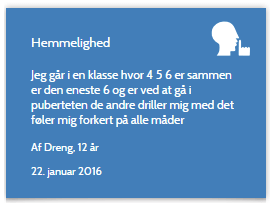 Secret from Cyberhus.dk: My class is a mix of 4-6 graders, I’m the only one from 6 and I’m hitting puberty, and the others make fun of me, I feel wrong in so many ways[/caption]
Secret from Cyberhus.dk: My class is a mix of 4-6 graders, I’m the only one from 6 and I’m hitting puberty, and the others make fun of me, I feel wrong in so many ways[/caption]
Participate!
The theme was well-received by youth at Cyberhus, and they actively participated in the group chat. On average, 20 young people were online in every group chat during the 3-hour session. We saw various attitudes toward, and perspectives on, bullying, and people shared their personal stories. The dialogue particularly addressed which emotions are linked to bullying, how you can avoid “hating” on social media, how groups can maintain or change a culture of bullying, and how words can hurt just as much as physical blows. Youth also did well in supporting and acknowledging each other, and encouraging people to say stop if they, or others, got bullied. Also, feelings related to the consequences of bullying, and bullying in general, must be articulated, so we can learn more about understanding our emotions and how we respect one another. Furthermore, people agreed that we must focus on how we avoid bullying, starting during early schooling.
“There is a bully-mentality in the group that is difficult to go against. A kind of implied accept that bullying does happen”
Anonymous youth during our group chat on bullying
Youth: Assume accountability for change
More practically speaking, youth generally agreed that cultures of bullying can only be changed by creating initiatives or efforts targeting the group as a whole. Both students, parents, and teachers have to assume accountability for change. If bullying is already present, it may be a good idea to speak with all the students individually, and not just having conversations with those directly involved. It was also pointed out that it is a good idea to explain potential consequences of bullying, and have a previous victim of bullying tell their story. This way, we include both emotion, reason, and credibility. [caption id="attachment_14720" align="alignright" width="267"]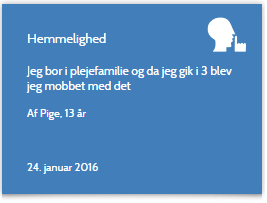 Secret from Cyberhus.dk: I live with a foster family and when I was in 3rd grade, I was bullied because of it[/caption]
Bullying is a very present problem, and the stories from Cyberhus’ group chat testify to very serious consequences. At Centre for Digital Youth Care and Cyberhus, we will continue making an effort to create dialogues on bullying, and give youth the opportunity to reflect on their behaviour, offline as well as online.
The campaign contributes to a larger EU-collaboration, the anti-bullying project, ENABLE.
Fore more information, please contact: signe@cfdp.dk]]>
Secret from Cyberhus.dk: I live with a foster family and when I was in 3rd grade, I was bullied because of it[/caption]
Bullying is a very present problem, and the stories from Cyberhus’ group chat testify to very serious consequences. At Centre for Digital Youth Care and Cyberhus, we will continue making an effort to create dialogues on bullying, and give youth the opportunity to reflect on their behaviour, offline as well as online.
The campaign contributes to a larger EU-collaboration, the anti-bullying project, ENABLE.
Fore more information, please contact: signe@cfdp.dk]]>
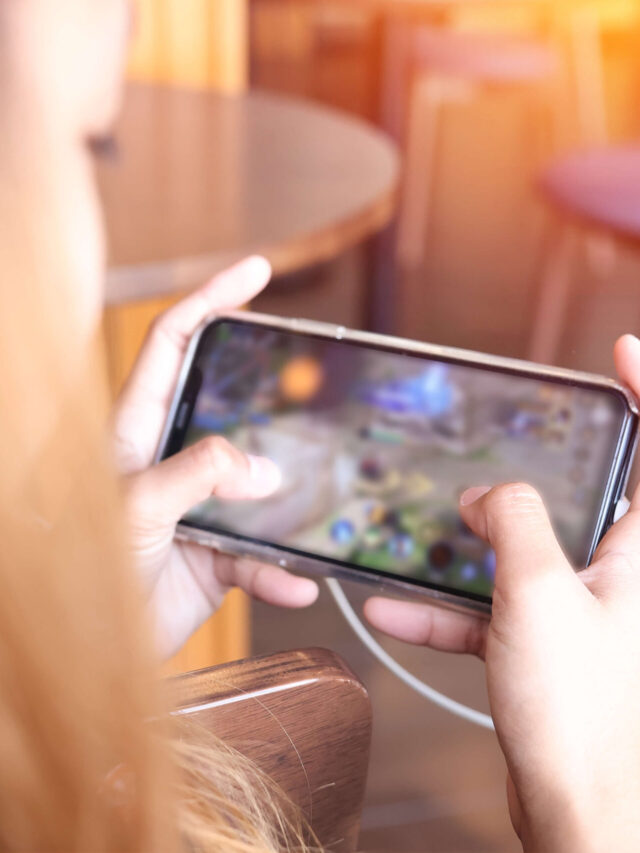
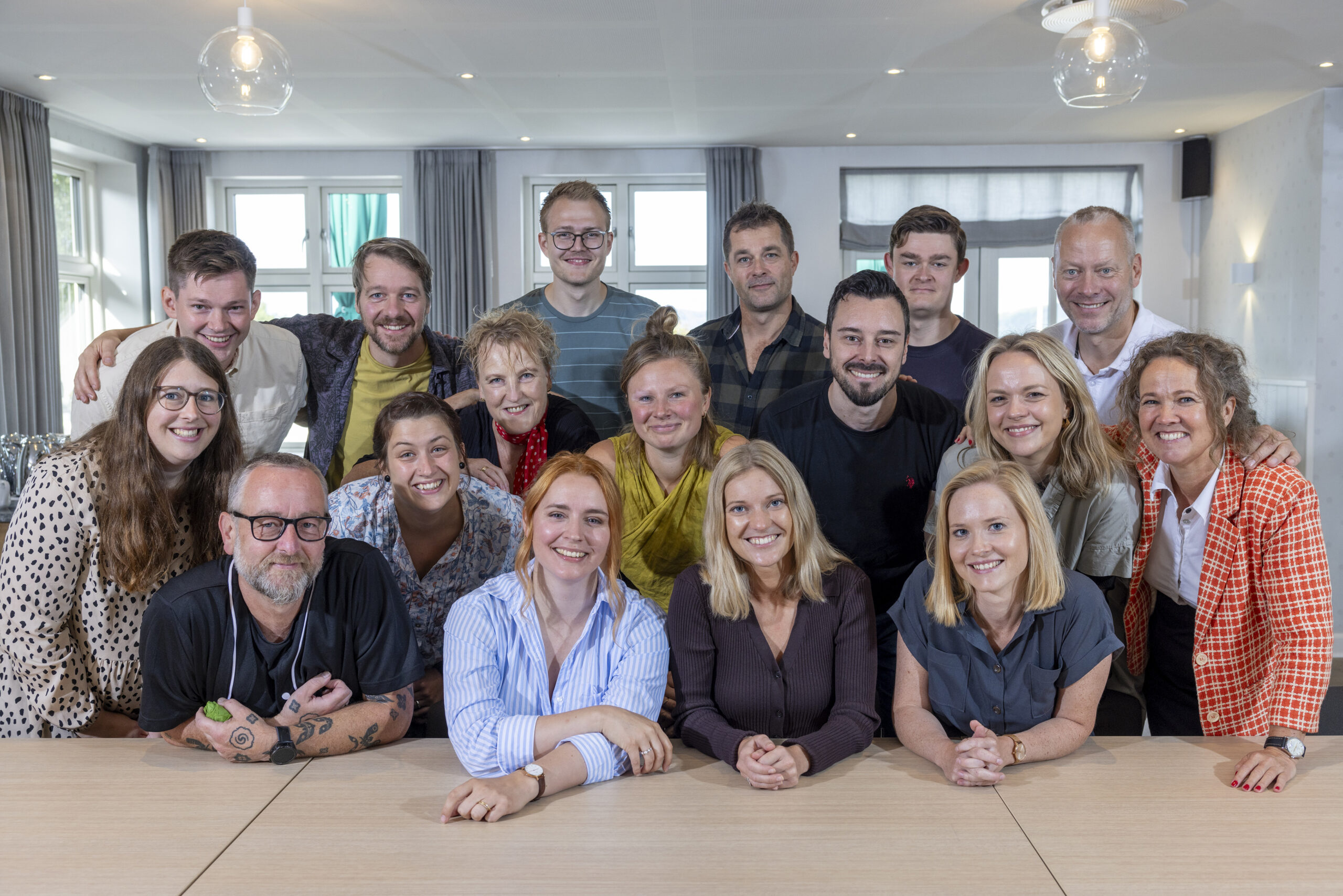
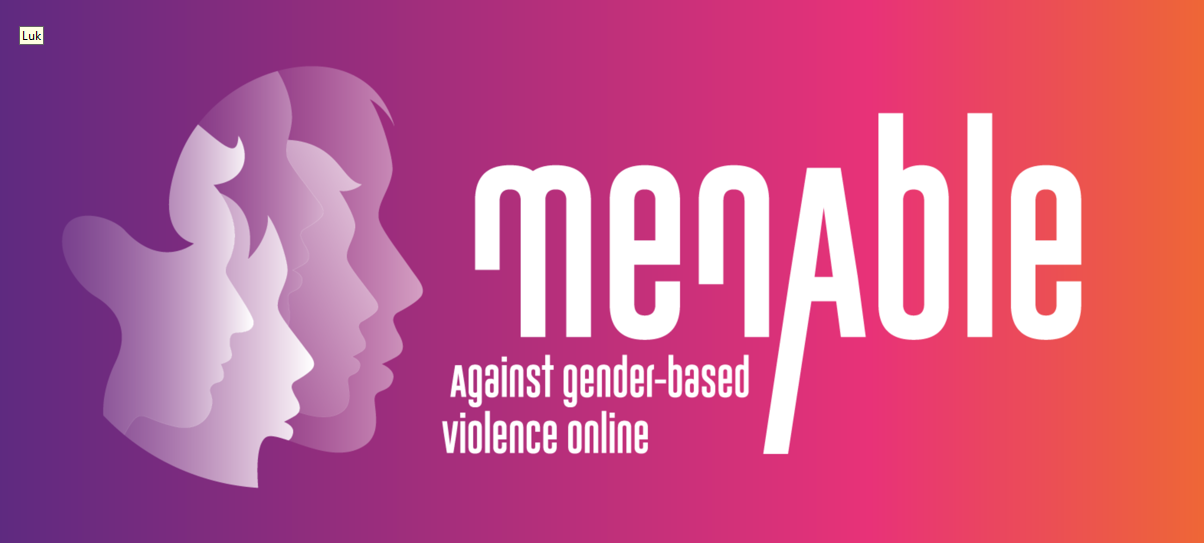
Hvis du vil sætte et par ord på din feedback, vil det hjælpe os rigtig meget til at forbedre vores indhold.